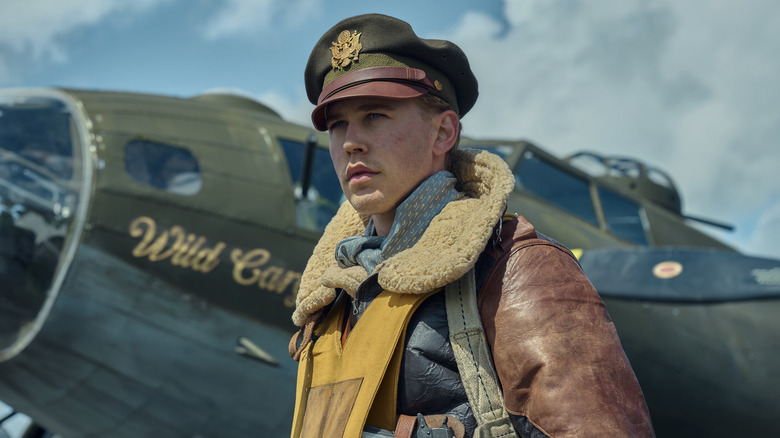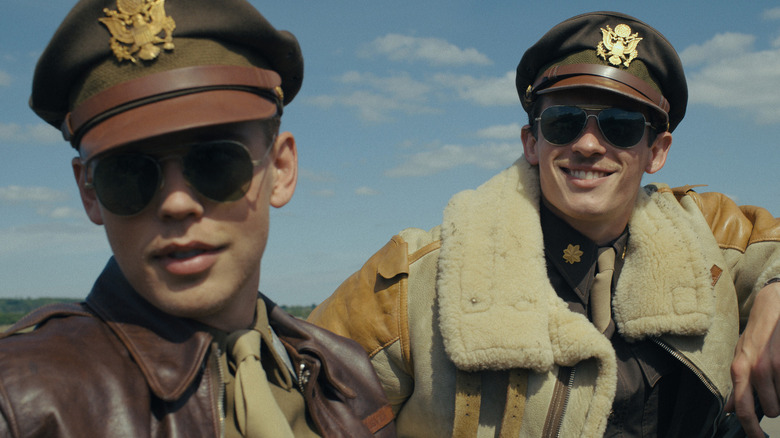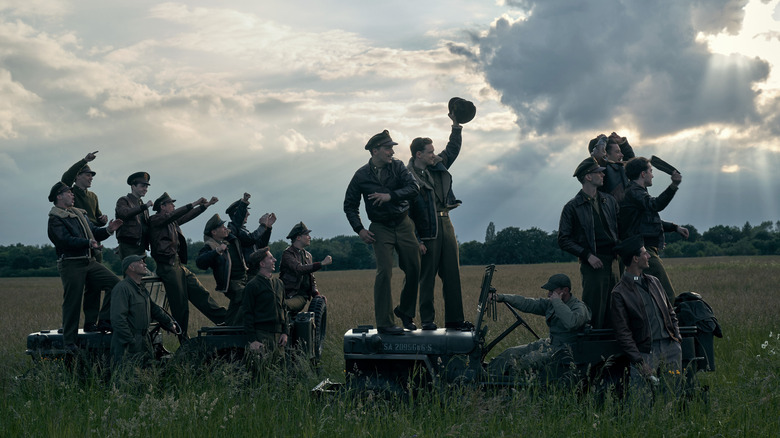Masters Of The Air Review: A Tepid World War II Drama
- Moments of poignancy
- Exciting dogfight sequences
- Characters are underdeveloped
- Lays the Americana on thick
If there's one thing you can always count on Hollywood investing in, it's a World War II drama. Honestly, they're like catnip. "Masters of the Air" takes on the tried-and-true formula that saw "Band of Brothers" become such a success in the early 2000s — albeit with mixed results. The aviation drama features a murderer's row of hot young stars, from Austin Butler and Callum Turner to Barry Keoghan and Ncuti Gatwa. But some dogfight action notwithstanding, the positioning of the characters in bombers high up in the sky lessens the tension we feel in their on-the-ground military counterparts in projects like "Band of Brothers" and "Saving Private Ryan." Still, "Masters of the Air" is a stylish production that should attract fans of the genre, even if it frequently plays it safe, serving as a throwback piece rather than creating a new spin on the World War II drama.
When "Masters of the Air" begins, the Americans have finally joined the war, with hundreds of trained pilots shipping out for active duty as bombing raids are planned across Europe. Chief among them are Major John "Bucky" Egan (Callum Turner) and Major Gale "Buck" Cleven (Austin Butler), a pair of friends with a strong emotional connection to one another and the leadership experience to make them two of the country's greatest assets as pilots and mission leaders. We watch them take on gravity-defying missions that expose just how vulnerable bombers are in the sky, and how much the odds are stacked against them with German fighters raining fire in every direction. Each day is a new battle, one in which a significant number of crewmen are not necessarily expected to survive.
Dogfights and emotional distance
"Masters of the Air" does a good job of capturing the stress and danger of a World War II dogfight, with dramatic aviation sequences that show the expertise and calm under pressure required of anyone flying into battle. In a world where so much of modern-day flying is automated, it's exciting to see the sheer technical knowledge that everyone employed in a bomber would need to keep the plane going under hazardous circumstances. Still, the action often isn't as in-your-face as we're used to in other combat dramas, as we frequently see planes going down through the window of another bomber's cockpit, creating an emotional distance that dampens the impact. Ironically, the show comes alive most when its characters are put on the ground, like in one early episode when an American airman crash lands in occupied Europe and is forced to rely on members of the resistance to help get him to safety. For aviation enthusiasts, the dogfights in "Masters of the Air" will likely be a dream come true, but for more casual audiences, they tend to be a little static.
Although the show has plenty of good actors on its cast list, the ensemble nature of "Masters of the Air" makes it difficult for audiences to connect with individual characters. It doesn't do a great job of developing them beyond basic archetypes, and even with the main characters that the narrative hinges on, viewers may not care as much about them as we should. The writing seems to focus entirely on the high drama of the life-threatening situations they put themselves into, but shockingly few actual character-building moments sneak into the production. In many instances, the extended flight sequences actually take away from time that should be devoted to helping us get to know the people.
American as apple pie
For better or worse, "Masters of the Air" is an entirely earnest, nostalgia-driven show that harks back to the glory that many enthusiasts perceive to be intrinsic to the U.S. involvement in World War II. It lays on the Americana pretty thick, and it makes sense why — this, like many other productions about this time period, is a boomer's romanticized vision of their father's war. It clearly holds the fighter pilots in the highest esteem, treating them almost like gods or superheroes rather than mere men, at the expense of developing their humanity. There's an air of untouchability that walls them off from emotional connection, and there are only a few moments where we're able to push through that.
From a technical perspective, "Masters of the Air" does everything right, effectively evoking a sense of danger in which these brave airmen throw themselves into situations where they know their survival is unlikely. But although they're continually in perilous circumstances, the show itself can't help but play it safe. If you're a die-hard World War II enthusiast, "Masters of the Air" will probably hit the sweet spot in capturing what makes this specific genre so appealing. But viewers with less of an emotional attachment to the period may find it harder to connect with — there's little here that we haven't seen done before, and frequently better.
"Masters of the Air" premieres on Apple TV+ on January 26.


